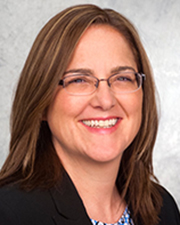McCullough Wins Stroke Association Lecture Award

 The American Stroke Association has named Louise McCullough, MD, PhD, professor, chair, and Roy M. and Phyllis Gough Huffington Distinguished Chair in the Department of Neurology at McGovern Medical School at UTHealth Houston, as the 2024 Thomas Willis Lecture Award winner. The Thomas Willis Lecture Award recognizes contributions to the investigation and management of stroke basic science. The award is open to fellows of the Stroke Council who are actively engaged in and have made significant contributions to basic science research on stroke.
The American Stroke Association has named Louise McCullough, MD, PhD, professor, chair, and Roy M. and Phyllis Gough Huffington Distinguished Chair in the Department of Neurology at McGovern Medical School at UTHealth Houston, as the 2024 Thomas Willis Lecture Award winner. The Thomas Willis Lecture Award recognizes contributions to the investigation and management of stroke basic science. The award is open to fellows of the Stroke Council who are actively engaged in and have made significant contributions to basic science research on stroke.
The award carries a $2,000 honorarium and complimentary registration to the American Stroke Association International Stroke Conference, where McCullough presented her research in a lecture entitled “Aging, Sex, and Stroke: The Three Amigos of Brain Misadventures.” The award is one of 11 granted at the International Stroke Conference 2024 for exceptional professional achievements. The entire group of awardees include four groundbreaking scientists who have devoted their careers to stroke research and six scientists who were recognized for their notable new research.
A renowned investigator, McCullough is well recognized for her work in cerebral vascular disease and is known for her research identifying sex differences in cell death pathways during stroke, which have been shown to be a major factor in the response to ischemic insult. Her clinical expertise is in sex/gender disparities, the microbiome, stroke and aging, and acute stroke treatments.
McCullough, the co-director and associate vice president for research with UTHealth Houston Neurosciences, who also is affiliated with The University of Texas MD Anderson Cancer Center UTHealth Houston Graduate School of Biomedical Sciences, says she is “incredibly honored to have been selected for the Thomas Willis Lecture Award.”
The American Stroke Association is a division of the American Heart Association devoted to saving people from stroke – the second leading cause of death in the world and a leading cause of serious disability. The organization teams with millions of volunteers to fund innovative research, fight for stronger public health policies, and provide lifesaving tools and information to prevent and treat stroke.
In This Section:
Features:
- True to Our Values
- The Heart-Brain Program: A Closed-Loop Continuum of Care to Patients with PFO-Associated Stroke
- Multidisciplinary Programs Provide Convenience and a Broader View of Health to Physicians and Patients
Patient Stories:
- Alabama Woman Finally Gets a Sleep Disorder Diagnosis Through Telehealth
- Radiofrequency Ablation (RFA) for severe back pain
- Finally Getting a Good Night’s Sleep with remedē®
- Making a Difference by Participating in Huntington’s Disease Research
Research & Trials:
- Sensitizing Tumors to Radiation Therapy Using Gold Nanoparticles
- An Investigation: Th-1 Dendritic Cell Immunotherapy in Combination with Standard Chemoradiation for Adjuvant Treatment of Adult Glioblastoma
- Advances in the Diagnosis and Management of Cluster Headache
- AI-Powered Algorithms May Help Detect Unruptured Brain Aneurysms
Accolades & News:
- Department of Neurosurgery Ranks 4th in NIH Funding Among US Clinical Science Departments
- McCullough Wins Stroke Association Lecture Award
- UTMOVE Receives Distinguished Edmond J. Safra Fellowship in Movement Disorders
- Schiess Awarded UTHealth Houston President’s Scholar Award
- Burish Co-Chairs the AHS Scientific Program Committee
- Furr Stimming Named HSG Outstanding Investigator
- Lo Receives UT System STARs Award
- Burish Assumes Responsibility for Neurology Residency Training for Headache Medicine
- Morcos Named Chair of Neurosurgery











